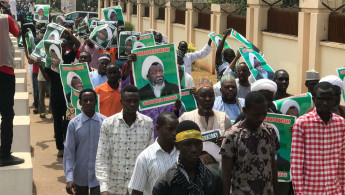#FreeZakzaky: Protesters demand release of dying Muslim leader in Nigeria
Sit-ins are taking place outside Nigerian embassies and consulates in London, Istanbul, Washington DC, and New York, where protesters are calling on authorities to release the spiritual leader and head of the Islamic Movement of Nigeria (IMN), Sheikh Ibrahim Zakzaky.
His wife was also detained in December 2015 following a raid of Zakzaky's home, which led to the killing of thousands of his followers during subsequent protests.
Earlier this week, a Nigerian court adjourned a special hearing to grant medical access to Zakzaky, in a move that has been condemned by rights activists.
"By repeatedly adjourning the hearing, the authorities are purposely delaying Zakzaky from receiving any medical attention despite being aware that his health has dangerously deteriorated," Afreen Rizvi, an activist with the #FreeZakzaky movement told The New Arab.
"In the coming days, the world may witness a silent assassination of a peaceful cleric," Rizvi added.
Calls for concern increased after two reports were issued by the London-based Islamic Human Rights Commission (IHRC) following a visit in April 2016 detailing Zakzaky's health conditions and confirming the need for urgent specialist treatment which could only be fully accessed abroad.
IHRC revealed "worrying" levels of Cadmium were found in the urine samples taken from Zakzaky.
Nigeria, Africa's largest economy, is almost evenly split between a mostly Muslim north - which is predominantly Sunni - and a largely Christian south.
The December 2015 clashes that led to Zakzaky's detention saw the army kill more than 300 of his supporters, who were buried in mass graves, according to human rights groups.
Zakzaky has been at loggerheads with Nigeria's secular authorities for years because of his calls for an Iranian-style Islamic revolution. Northern Nigeria is majority Sunni Muslim.
The cleric, who is in his mid-sixties and lost the sight in one eye during the 2015 clashes, has only been seen in public twice since he was detained.
Nigeria's government has previously ignored a court order to release Zakzaky and his wife.
A judge in Abuja on 2 December called the detention of Zakzaky and his followers "illegal and unconstitutional", and imposed a 45-day deadline for their release. Nigeria's government ignored the court order.
Amnesty Nigeria director, Makmid Kamara at the time said the government "will demonstrate a flagrant - and dangerous - contempt for the rule of law" if it ignored the ruling.
"Zakzaky is being unlawfully detained," he said in an emailed statement.
"This might be part of a wider effort to cover up the gruesome crimes committed by members of the security forces in Zaria in December 2015 that left hundreds dead."
Last year, Amnesty International accused Nigeria's security forces of killing dozens by using "horrific" force during another crackdown on protesting supporters of the imprisoned Shia cleric.
The rights organisation said it had "strong evidence" that police and soldiers used automatic weapons against members of IMN at marches in and around Abuja.
"We have seen a shocking and unconscionable use of deadly force by soldiers and police against IMN members," said Amnesty's Nigeria director, Osai Ojigho.
"Video footage and eyewitness testimonies consistently show that the Nigerian military dispersed peaceful gatherings by firing live ammunition without warning," she added.
"Those injured were shot in different parts of the body - head, neck, back, chest, shoulder, legs, arms - and some of them had multiple gunshot wounds."
Ojigho said the "horrific use of excessive force" was not crowd control but aimed to kill, calling for an independent probe and the prosecution of those responsible.
The Nigerian army triggered outrage after using a video of US President Donald Trump saying soldiers would shoot migrants throwing stones to justify their own deadly suppression of Shia protesters in Abuja.
The tweet was later taken down. The military says six people were killed when it fired live bullets at the protesters but human rights groups and the IMN say more than 45 died.
Follow us on Twitter: @The_NewArab





 Follow the Middle East's top stories in English at The New Arab on Google News
Follow the Middle East's top stories in English at The New Arab on Google News
![Israeli forces ordered bombed Gaza's Jabalia, ordering residents to leave [Getty]](/sites/default/files/styles/image_330x185/public/2176418030.jpeg?h=a5f2f23a&itok=_YGZaP1z)

